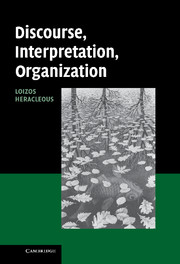Book contents
- Frontmatter
- Contents
- List of figures
- List of tables
- Preface
- 1 Images of discourse: interpretive, functional, critical, and structurational
- 2 Interpretive approaches to organizational discourse
- 3 Functional approaches: metaphor in organization change and development
- 4 Critical approaches: Michel Foucault's conceptions of discourse
- 5 A structurational approach to discourse
- 6 Analyzing discourse I: discourse as situated symbolic action
- 7 Analyzing discourse II: a tale of three discourses
- Index
- References
3 - Functional approaches: metaphor in organization change and development
Published online by Cambridge University Press: 22 September 2009
- Frontmatter
- Contents
- List of figures
- List of tables
- Preface
- 1 Images of discourse: interpretive, functional, critical, and structurational
- 2 Interpretive approaches to organizational discourse
- 3 Functional approaches: metaphor in organization change and development
- 4 Critical approaches: Michel Foucault's conceptions of discourse
- 5 A structurational approach to discourse
- 6 Analyzing discourse I: discourse as situated symbolic action
- 7 Analyzing discourse II: a tale of three discourses
- Index
- References
Summary
In chapter 1 we suggested that functional approaches view discourse as language-based communication to be employed by managerial and social actors for achieving certain organizationally (and often personally) relevant ends. Discourse is seen as a tool at actors' disposal rather than as a constraining, dominating feature of social life (as in the critical approach); or as a shaping influence and a window to the ideational, symbolic world of organizations (as in the interpretive approach). In this chapter we illustrate functional approaches to organizational discourse through a discussion of how aspects of discourse, particularly metaphors, can be employed in efforts to accomplish more effective organization change and development.
One key underlying assumption of functionally oriented approaches, often left implicit, is the interpretive insight that organizational discourse can not only provide access to the conceptual world of organizations but can also be used as an avenue for influencing this world. Effective organizational change and development presents a set of perennial managerial problems. A discourse perspective highlights and illustrates that dealing with such problems is not just about the “hard” structural aspects of organizations, but requires an in-depth appreciation of the cultural, human aspects of organizations, and taking corresponding actions based on this appreciation.
Soft aspects of Effective Change Management and the Role of Discourse
The management of change poses a fundamental challenge to managers, which has prompted an immense amount of practitioner-oriented literature on how to effectively manage change (e.g. Champy and Nohria, 1996; Kotter, 1996).
Information
- Type
- Chapter
- Information
- Discourse, Interpretation, Organization , pp. 55 - 78Publisher: Cambridge University PressPrint publication year: 2006
